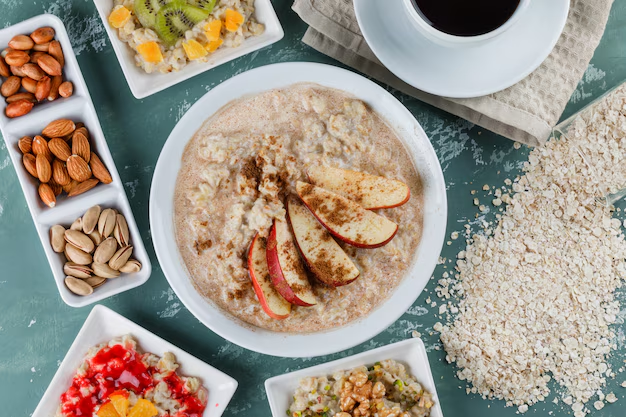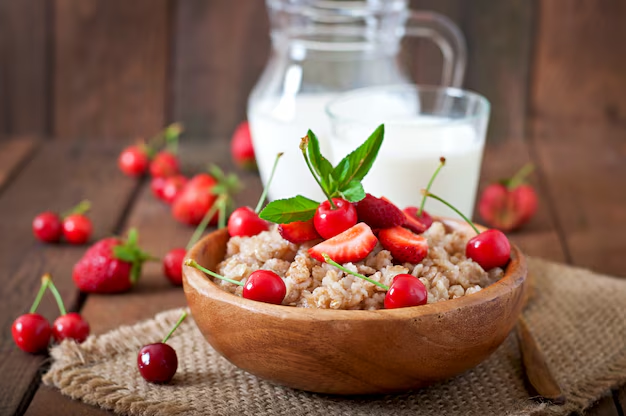Oatmeal is celebrated as a fiber-rich breakfast staple, perfect for starting the day on a healthy note. But is oatmeal high in fiber, and what makes it so beneficial? Dietary fiber plays a vital role in maintaining digestive health, controlling blood sugar levels, and reducing cholesterol. A balanced diet with adequate fiber improves overall well-being and supports heart health.
This article explores the fiber content of oatmeal, delving into the differences between various types and cooking methods. We’ll also discuss its health benefits and how it compares to other foods in terms of fiber. If you’re curious about optimizing your fiber intake, this guide is tailored for you.
What Makes Oatmeal High in Fiber?
Oatmeal is a powerhouse breakfast for dietary fiber, with approximately 4 grams of fiber per cup of cooked oats. The primary types of fiber in oatmeal are soluble fiber and insoluble fiber, each offering unique health benefits:
- Soluble fiber (like beta-glucan): Dissolves in water, forming a gel-like substance that helps lower cholesterol and stabilize blood sugar.
- Insoluble fiber: Promotes bowel health by adding bulk to stool, preventing constipation.
Types of Oatmeal and Fiber Content
The fiber content in oatmeal can vary depending on its type. Here’s a quick breakdown:
- Steel-cut oats: Packed with fiber due to minimal processing, offering the highest amount.
- Old-fashioned oats: Retain a significant portion of fiber while being easier to prepare than steel-cut oats.
- Instant oats: Still contain fiber but slightly less due to extensive processing.
Does Cooking Affect Fiber?
Cooking methods can impact oatmeal’s fiber content. While the raw fiber content remains the same, the volume of oatmeal may increase when cooked, slightly diluting the fiber concentration. For example, 1/2 cup of dry oats becomes about 1 cup of cooked oatmeal but still contains roughly the same total fiber.
Read: Cream of Wheat Vs Oatmeal: The Differences Will Surprise You!
Types of Oatmeal and Their Fiber Levels
Let’s find out the fiber content in different types of oatmeal.
1. Is Steel-Cut Oatmeal High in Fiber?
Yes, steel-cut oatmeal is one of the highest in fiber. With its coarse texture and minimal processing, it offers around 5 grams of fiber per 1/4 cup (dry). Its slow digestion supports prolonged fullness, making it ideal for those seeking sustained energy and digestive health benefits.
2. Is Instant Oatmeal High in Fiber?
Instant oatmeal contains less fiber compared to steel-cut or old-fashioned oats, with about 3 grams per serving. The fine processing to achieve quick cooking reduces some fiber. However, it’s still a nutritious option when fortified with additional fiber.
Tip: Choose plain instant oatmeal instead of flavored options to avoid added sugars.
3. Is Old-Fashioned Oatmeal High in Fiber?
Old-fashioned oatmeal is another excellent source of fiber, containing about 4 grams per serving. The rolled texture retains a substantial amount of fiber while being more versatile than steel-cut oats.
4. Is Quick Oatmeal High in Fiber?
Quick oats, similar to instant oatmeal, provide around 3–4 grams of fiber per serving. They undergo more processing than old-fashioned oats, but their convenience and nutritional value make them a good option for busy mornings.
5. Is Baby Oatmeal High in Fiber?
Baby oatmeal is finely ground for easier digestion but still retains fiber. It typically contains 2–3 grams per serving, making it suitable for introducing dietary fiber to infants.
Caution: Consult a pediatrician before adding fiber-rich foods to a baby’s diet.
6. Is Cooked Oatmeal High in Fiber?
Cooked oatmeal is rich in fiber, with 4 grams per 1 cup. While cooking may change the texture and volume, the fiber content remains constant, offering the same benefits for digestion and heart health.
7. Is Gluten-Free Oatmeal High in Fiber?
Yes, gluten-free oatmeal contains the same fiber as regular oatmeal. It’s an excellent option for individuals with gluten sensitivities or celiac disease, providing about 4 grams of fiber per serving.
Note: Ensure the gluten-free label to avoid cross-contamination during processing.
8. Is Plain Oatmeal High in Fiber?
Plain oatmeal, free from added flavors or sugar, offers the most pure fiber content. A serving of plain oatmeal contains 4 grams of fiber and is a great base for healthy toppings like fruits and nuts.
10 Health Benefits of Oatmeal

Oatmeal is more than just a comforting breakfast; it’s a powerhouse of nutrients with numerous health benefits. Whether you enjoy it in the morning, at night, or with milk, oats are a versatile food that can enhance your well-being. This article explores the top health benefits of oatmeal, its nutritional value, and important considerations.
1. Aids in Weight Loss
Oatmeal is rich in soluble fiber, particularly beta-glucan, which helps you feel full longer. This reduces the urge to snack between meals. The slow digestion of oats also stabilizes blood sugar levels, minimizing sudden hunger pangs.
2. Lowers Cholesterol Levels
Beta-glucan in oats binds to cholesterol in the gut, reducing its absorption. This mechanism lowers bad cholesterol (LDL) without affecting good cholesterol (HDL), promoting heart health.
3. Supports Heart Health
The combination of fiber, antioxidants, and healthy fats in oatmeal works to protect your heart. Oats help reduce inflammation, which is a key factor in cardiovascular diseases.
4. Improves Digestive Health
Oatmeal is an excellent source of dietary fiber, which promotes regular bowel movements and prevents constipation. The prebiotic effect of oats nourishes beneficial gut bacteria, enhancing gut health.
5. Boosts Energy Levels
Oats provide complex carbohydrates, which release energy slowly. This makes oatmeal a great option for sustained energy throughout the day or before a workout.
6. Stabilizes Blood Sugar
Oats have a low glycemic index, which means they cause a gradual rise in blood sugar. This is especially beneficial for people with diabetes or those looking to manage their blood sugar levels.
7. Enhances Immune Function
Beta-glucan not only benefits your cholesterol levels but also strengthens your immune system. It enhances the activity of white blood cells, helping your body fight infections.
8. Promotes Skin Health
Oatmeal’s anti-inflammatory properties can soothe itchy, irritated skin. It is often used in skincare products to treat conditions like eczema and acne.
9. Reduces Stress
Oats contain magnesium, which helps regulate the nervous system. A warm bowl of oatmeal can act as a comfort food, reducing stress and improving mood.
10. Helps Reduce Risk of Cancer
The antioxidants and fiber in oats are linked to a reduced risk of certain cancers, such as colorectal cancer. Their anti-inflammatory properties play a role in cancer prevention.
Benefits of Eating Oatmeal at Night
Eating oatmeal at night can be a healthy option, especially if you’re looking for a light, satisfying meal. Here are some specific benefits:
- Better Sleep: Oats are rich in melatonin and magnesium, which help promote relaxation and improve sleep quality.
- Keeps You Full: Eating oatmeal at night curbs midnight cravings and keeps you satiated till morning.
- Supports Recovery: For athletes, oats consumed at night can help replenish energy stores and aid muscle recovery.
Benefits of Oats with Milk

Pairing oats with milk creates a nutrient-dense meal. Here’s why:
- Calcium and Vitamin D: Milk adds calcium and vitamin D, strengthening bones and teeth.
- Complete Protein: Combining oats and milk provides a complete protein source, essential for muscle repair and growth.
- Creamy Texture: Milk enhances the taste and creaminess of oatmeal, making it more enjoyable to eat.
Oatmeal’s Role in Weight Loss, Cholesterol Reduction, and Heart Health
Here are the details about oatmeal’s role in weight loss, cholesterol reduction, and heart health.
- Weight Loss
Oatmeal is a low-calorie, nutrient-dense food. Its high fiber content suppresses appetite and supports weight management. Additionally, oats are free of added sugars and unhealthy fats, making them a guilt-free choice.
- Cholesterol Reduction
Beta-glucan in oats absorbs cholesterol and bile acids, which are then excreted from the body. This natural process helps reduce the risk of cardiovascular diseases.
- Heart Health
The antioxidants in oats, such as avenanthramides, protect blood vessels from damage and improve blood flow. Regular consumption of oatmeal lowers blood pressure, further reducing the risk of heart disease.
Disadvantages and Considerations
While oatmeal is generally healthy, there are a few points to consider:
- Overeating: Consuming large portions can lead to excess calorie intake, which may hinder weight loss goals.
- Instant Oatmeal: Pre-packaged instant oats often contain added sugars and artificial flavors. Opt for plain oats for maximum benefits.
- Food Allergies: Although rare, some people may have an allergy to oats or cross-contaminants like gluten.
Nutritional Value of Oats
Oats are nutrient-rich and provide a variety of essential macronutrients and micronutrients. Here’s a breakdown of their nutritional profile:
| Nutrients | Amount (per 100g) |
| Calories | 389 kcal |
| Protein | 16.9 g |
| Carbohydrates | 66.5 g |
| Dietary Fibers | 10.6 g |
| Fat | 6.9 g |
| Calcium | 54 mg |
| Irom | 4.7 mg |
| Magnesium | 177 mg |
| Zinc | 3.1 mg |
Special Focus on Fiber
The high fiber content in oats aids digestion, regulates blood sugar, and lowers cholesterol. Steel-cut and rolled oats offer more fiber than instant varieties, making them the healthier choice.
Read: Baked Sweet Potato Oatmeal for One
FAQs
1. Can I eat oatmeal every day?
Yes, you can eat oatmeal daily. It’s a nutrient-dense food rich in fiber, vitamins, and minerals. Regular consumption supports digestion, lowers cholesterol, and promotes heart health. Choose plain, unsweetened oatmeal to avoid added sugars, and pair it with healthy toppings like fruits or nuts for balanced nutrition.
2. What’s the healthiest type of oatmeal?
Steel-cut oats are the healthiest type due to minimal processing retaining more fiber and nutrients. They have a lower glycemic index, providing sustained energy and improved blood sugar control. Old-fashioned oats are also nutritious, but instant oatmeal often contains added sugars and fewer health benefits.
3. Is oatmeal good for people with diabetes?
Yes, oatmeal is beneficial for people with diabetes. It contains soluble fiber, which slows digestion, stabilizing blood sugar levels. Choose unsweetened varieties and pair oatmeal with protein or healthy fats to further prevent blood sugar spikes. Avoid flavored or instant oats with added sugars.
4. Can oatmeal help in muscle building?
Oatmeal supports muscle building by providing complex carbohydrates for energy and protein for muscle repair. It’s rich in nutrients like magnesium and iron, which are vital for muscle function. Pair oatmeal with protein-rich toppings like nuts, seeds, or Greek yogurt to maximize its benefits for muscle growth.
Conclusion
Oatmeal is a versatile and nutrient-packed food that can benefit your health in many ways. From improving digestion to reducing cholesterol and supporting heart health, oats are a simple yet powerful addition to your diet. For the best results, choose minimally processed oats and watch your portion sizes. By including oatmeal in your daily routine, you can take a significant step toward a healthier lifestyle.

